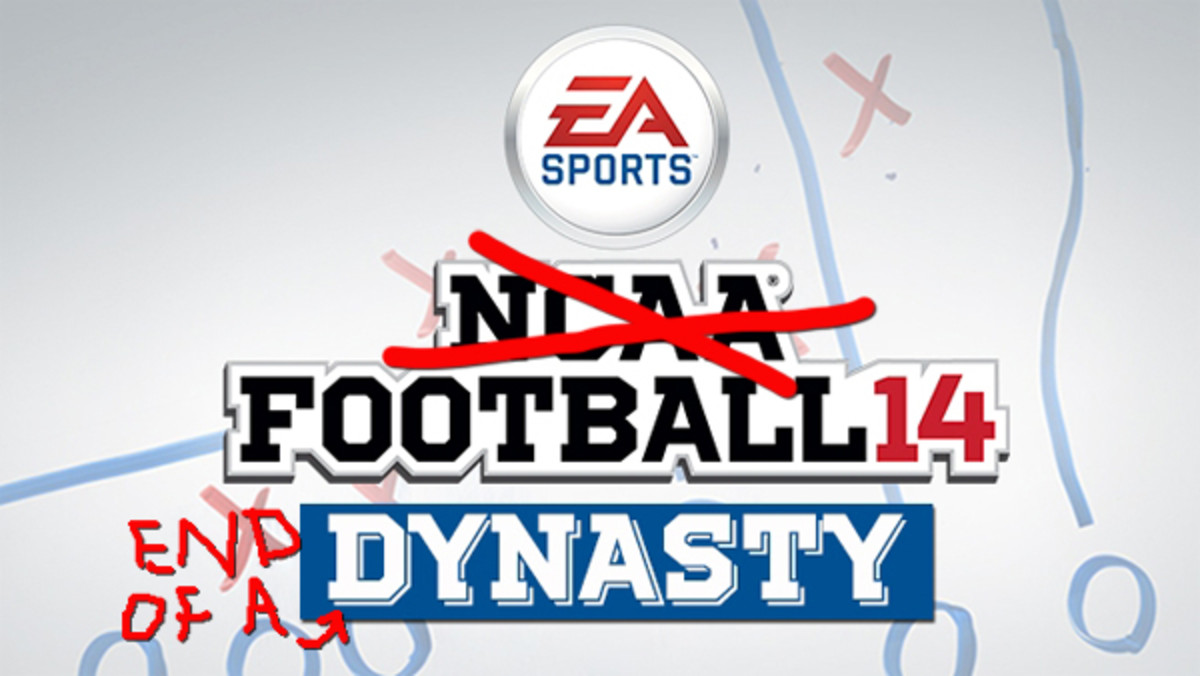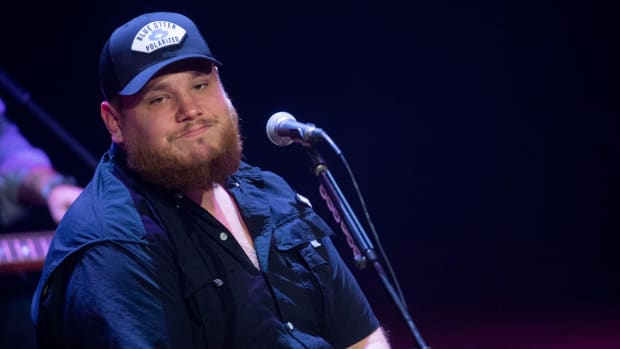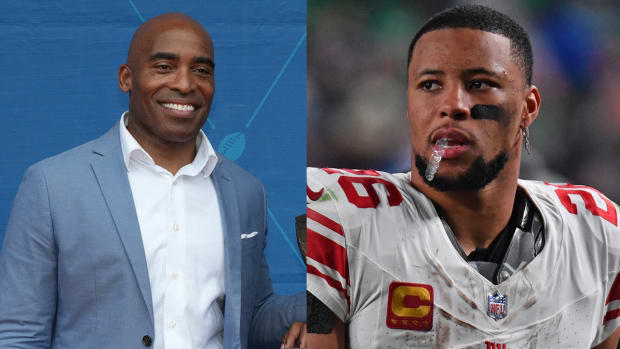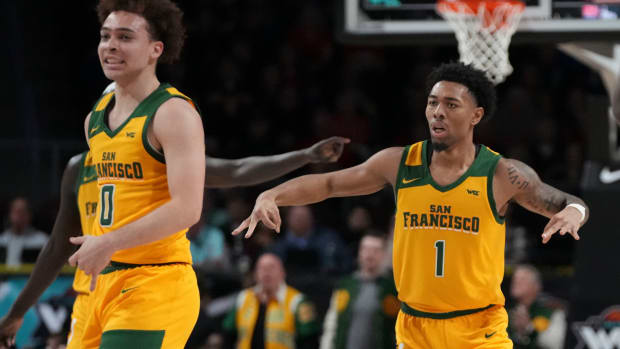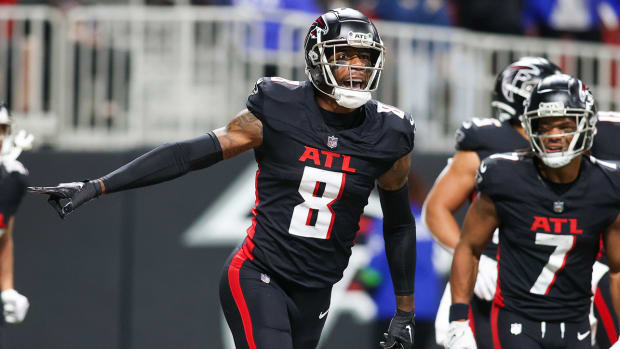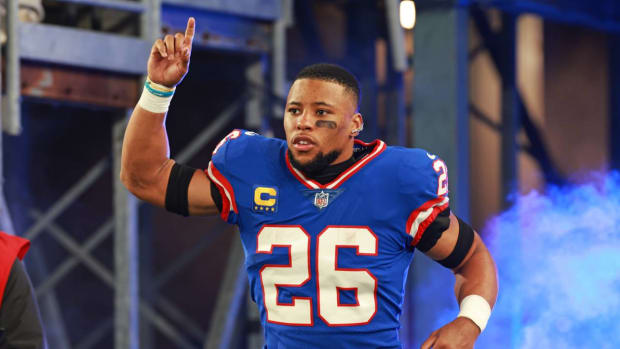The NCAA-EA Split Is Going to Change Everything, and That's Not Necessarily Bad
The NCAA announced on Wednesday that it will not sign a new licensing contract with EA Sports, publishers of the NCAA Football video game franchise. The decision means NCAA Football 14, which was released on July 9 for the Xbox 360 and Playstation 3, is the last in a popular series that began in 1997. Last year’s edition, NCAA Football 13, sold nearly 2 million copies.
If you can be sure of anything, it's that EA will continue publishing a college football game, just without the NCAA’s involvement. For the next year, EA will still have its exclusive contract with Collegiate Licensing Company (CLC), the NCAA’s licensing partner. CLC licenses on behalf of over 200 colleges, universities, conferences and bowl games. As a result, next year’s game will still feature many of the attributes that authenticated NCAA Football, including most teams and stadiums. It is notable, however, that CLC does not represent six teams that are on Andy Staples’ Post Spring Top 25: Ohio State, Oregon, Michigan State, Baylor, Northern Illinois and Virginia Tech. (The University of Southern California, University of South Alabama and Troy University are also not represented by CLC.) If it hasn’t already, EA would have to sign deals with those non-CLC schools in order to include their names and properties “in the game”.
But after next year, EA’s relationship with CLC will become non-exclusive. As part of the recent settlement in Pecover v. EA, a class action suit involving consumers who claimed EA's exclusive licensing deals with the NFL, NCAA and Arena Football League violated antitrust law, EA agreed not to renew its current deal with CLC. Instead EA and CLC will have a three-year, non-exclusive pact, which will enable CLC to enter into contracts with other publishers that want to develop college football games. If CLC treats a non-exclusive contract with EA as an exclusive one – i.e. by not accepting bids from other publishers – it could be sued under antitrust grounds.
In short, this week's news augured a significant upheaval of the college sports video game landscape. Really the only thing that won't change, at least in the short term, is the inability of college athletes to license their likenesses to video game publishers. (Of course.) Everything else is going to look much different, and the ramifications could be far-reaching.
Why the NCAA parted ways
The NCAA’s strategy in ending its licensing relationship with EA is presumably driven in part by legal considerations. Former UCLA basketball player Ed O’Bannon has sued the NCAA, CLC and EA in a potentially billion-dollar class action over whether the images and likenesses of former and current Division I men’s basketball and football players have been misappropriated for profit. The case is before U.S. District Judge Claudia Wilken, who is deciding whether to certify O’Bannon’s class. A trial is scheduled for June 2014, though it could be delayed for months.
It is quite possible, if not likely, that O’Bannon will reach a settlement with the defendants before a trial. But if no settlement is reached, the NCAA faces the prospect of losing in a devastating fashion. This is especially true since O’Bannon’s lawsuit contains antitrust claims, which carry damages that are automatically trebled, or multiplied by three. By cutting ties with EA, the NCAA reduces its extent of potential damages and also implies that it is not conspiring with the publisher. This is important given pretrial discovery in the O’Bannon case, which shows that EA used real players’ names to develop avatars in March Madness 2008.
The NCAA may also be thinking ahead to a possible scenario where the NCAA, CLC, and EA have to pay O’Bannon and his class, and there is disagreement among the three over their respective obligations. While the NCAA, CLC, and EA have collaborated for years, relationships can be strained by litigation. It's not inconceivable that the business partners could turn against, and eventually sue, one another.
Additionally, as SI’s Stewart Mandel observed, the timing of the NCAA’s decision may be connected to six current Division I football players joining O'Bannon's suit as plaintiffs. It is now harder to link the NCAA to their appearance in a forthcoming edition of EA's game.
A final motivation for the NCAA to cut ties with EA may have to do with jury selection. In a way, the NCAA may be telling consumers—and persons who may ultimately be picked to serve on O’Bannon’s jury—that suing the NCAA poses negative repercussions for consumers. Namely, they will lose out on video games they enjoy. While this message may not lead jurors to “blame” O’Bannon, the NCAA would not be the first defendant to portray a business decision as an unwanted consequence of litigation. Oil companies, for example, have long claimed that threat of environmental lawsuits prevent them from drilling explorations and, perhaps, lowering gas prices.
How this will impact EA’s college football offerings
No matter how EA spins it, a college football game without a NCAA license will seem less “real”. It will not be called NCAA Football, and it will lack any trace of NCAA images and insignia that, for good or bad, are part of the college football experience. More importantly, the game will be absent a number of major programs—no Ohio State Buckeyes, no USC Trojans—unless EA can strike separate deals with them. Some gamers may say they don’t care, particularly since they can continue to play as many real colleges, conferences, bowls and stadiums. But others would care, and even a modest reduction in realness could have a major impact on sales—especially in the ultra competitive video game market.
EA knows as well as any publisher that even an iconic sports franchise can come to an end. The company's NBA Live series, which launched in 1995, hasn’t been published since 2010 due to tepid interest and middling improvement. (It will reportedly be revived this October as NBA Live 14.) That's why you can expect EA to work extra hard in innovating next year’s college football game and aggressively marketing it. If the game is enhanced more than just incrementally, consumers may actually benefit from the NCAA’s decision to cut ties with EA.
What it means for other video game publishers
Arguably the most significant outcome of the NCAA's decision is that a weakened EA college football game could open the door for publishers to develop competing titles—particularly since the CLC will soon be legally compelled to at least consider new deals. Take-Two Interactive, for one, might want to add a college football game to its popular 2K sports series. From 1999 to 2004, Sega (which owned the rights to the 2K series prior to Take-Two) published NFL 2K, which featured real teams and players and which consistently received better reviews than rival Madden editions. The game was discontinued after EA reached an exclusive licensing deal with the NFL and NFLPA.
That said, if publishers do decide to develop their own college football titles, they'll have to be mindful of the litigation reach of O’Bannon v. NCAA, and the precedent of Ryan Hart v. EA. If a college football game features players who are “real” in every way other than their name (if their jersey number, home town, weight, height, race, position etc. all match up), it may be too “real” for its own good. A publisher of such a game could be sued by O’Bannon the same way O’Bannon has sued EA for allegedly profiting off of the image and likeness of players in NCAA Football.
Then there's the matter of what will happen when the O'Bannon suit is ultimately resolved. If the NCAA defeats O’Bannon both in a trial and appeal, it would set up the potential of a federal circuit split between the Ninth Circuit, where O’Bannon’s case is being litigated, and the Third Circuit. That might convince the U.S. Supreme Court to resolve the matter, meaning that the nine justices, who range in age from 53 to 80 and likely aren't video game experts, would decide controlling video game law. A publisher such as Sega or Konami may not want to be part of this skirmish, which could take years to play out and require substantial legal expenses.
Alternatively, if O’Bannon defeats the NCAA, we may not see collegiate video games with real players, named or otherwise, ever again. The precedent would be set: the avatars are real players.
Then again, maybe we will one day see a game with real players and their real names.
I know, I know. But here's why:
If O'Bannon wins or reaches a favorable settlement, a trust will likely be set up to distribute payments to players. That trust may also have the ability to negotiate a video game deal on behalf of players that choose to be in it. So in a circuitous way, O'Bannon winning could actually end up making college football games more realistic.
SI Legal Analyst Michael McCann is a Massachusetts attorney. He is also the founding director of the Sports and Entertainment Law Institute at the University of New Hampshire School of Law and the distinguished visiting Hall of Fame Professor of Law at Mississippi College School of Law. He’s also regularly played video games on most major consoles since the Atari 2600. Follow him on Twitter @McCanSportsLaw.
